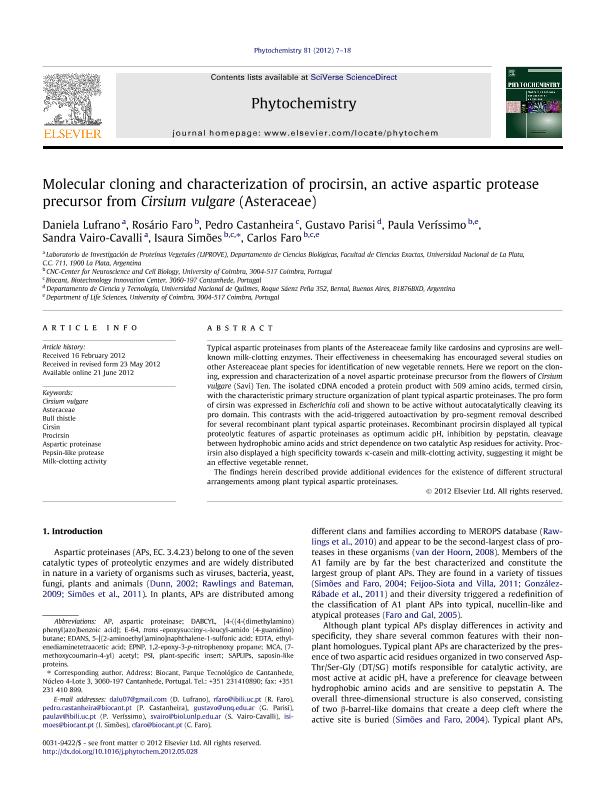Artículo
Molecular cloning and characterization of procirsin, an active aspartic protease precursor from Cirsium vulgare (Asteraceae)
Lufrano, Daniela ; Faro, Rosário; Castanheira, Pedro; Parisi, Gustavo Daniel
; Faro, Rosário; Castanheira, Pedro; Parisi, Gustavo Daniel ; Veríssimo, Paula; Vairo Cavalli, Sandra Elizabeth
; Veríssimo, Paula; Vairo Cavalli, Sandra Elizabeth ; Simões, Isaura; Faro, Carlos
; Simões, Isaura; Faro, Carlos
 ; Faro, Rosário; Castanheira, Pedro; Parisi, Gustavo Daniel
; Faro, Rosário; Castanheira, Pedro; Parisi, Gustavo Daniel ; Veríssimo, Paula; Vairo Cavalli, Sandra Elizabeth
; Veríssimo, Paula; Vairo Cavalli, Sandra Elizabeth ; Simões, Isaura; Faro, Carlos
; Simões, Isaura; Faro, Carlos
Fecha de publicación:
09/2012
Editorial:
Pergamon-Elsevier Science Ltd
Revista:
Phytochemistry
ISSN:
0031-9422
Idioma:
Inglés
Tipo de recurso:
Artículo publicado
Clasificación temática:
Resumen
Typical aspartic proteinases from plants of the Astereaceae family like cardosins and cyprosins are well-known milk-clotting enzymes. Their effectiveness in cheesemaking has encouraged several studies on other Astereaceae plant species for identification of new vegetable rennets. Here we report on the cloning, expression and characterization of a novel aspartic proteinase precursor from the flowers of Cirsium vulgare (Savi) Ten. The isolated cDNA encoded a protein product with 509 amino acids, termed cirsin, with the characteristic primary structure organization of plant typical aspartic proteinases. The pro form of cirsin was expressed in Escherichia coli and shown to be active without autocatalytically cleaving its pro domain. This contrasts with the acid-triggered autoactivation by pro-segment removal described for several recombinant plant typical aspartic proteinases. Recombinant procirsin displayed all typical proteolytic features of aspartic proteinases as optimum acidic pH, inhibition by pepstatin, cleavage between hydrophobic amino acids and strict dependence on two catalytic Asp residues for activity. Procirsin also displayed a high specificity towards κ-casein and milk-clotting activity, suggesting it might be an effective vegetable rennet. The findings herein described provide additional evidences for the existence of different structural arrangements among plant typical aspartic proteinases.
Archivos asociados
Licencia
Identificadores
Colecciones
Articulos(SEDE CENTRAL)
Articulos de SEDE CENTRAL
Articulos de SEDE CENTRAL
Citación
Lufrano, Daniela; Faro, Rosário; Castanheira, Pedro; Parisi, Gustavo Daniel; Veríssimo, Paula; et al.; Molecular cloning and characterization of procirsin, an active aspartic protease precursor from Cirsium vulgare (Asteraceae); Pergamon-Elsevier Science Ltd; Phytochemistry; 81; 9-2012; 7-18
Compartir
Altmétricas



